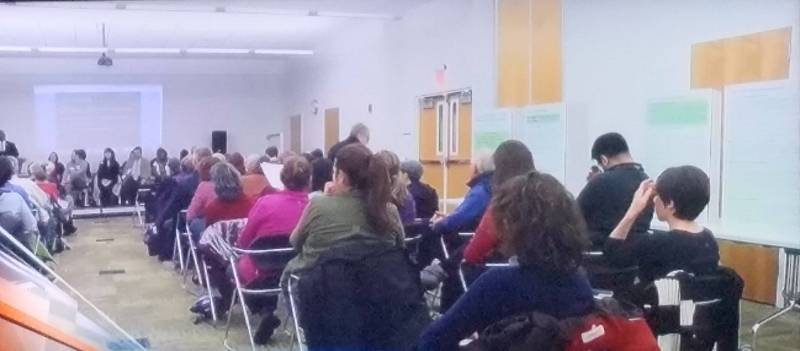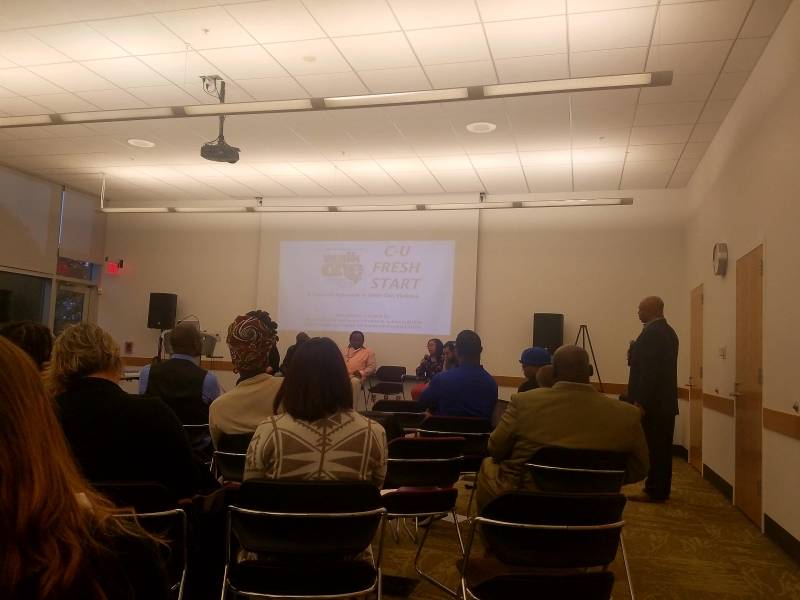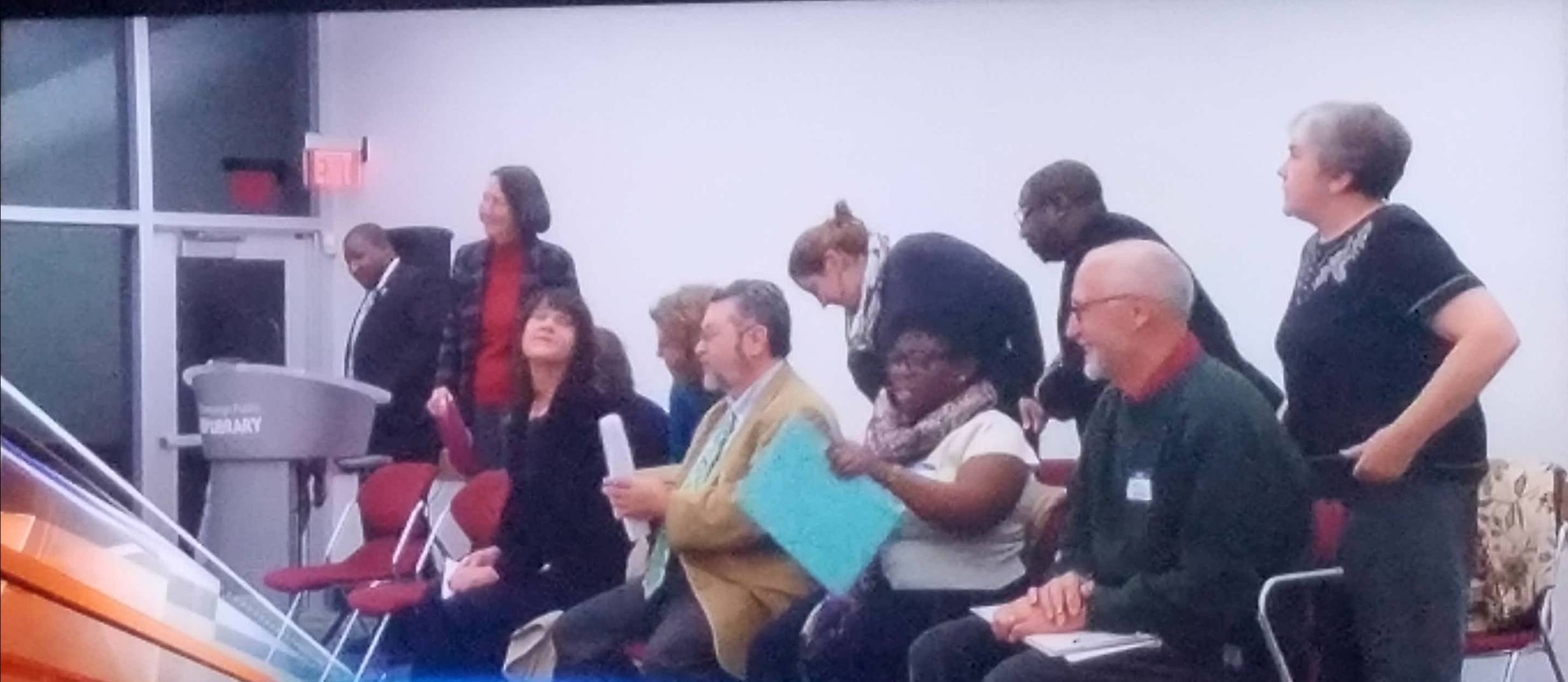Each time I return from a community meeting convened to discuss racial disparities, I marvel at how African Americans have survived in Champaign-Urbana for over a century. On the most recent occasion, I attended the November 30 Champaign County Board Racial Justice Task Force meeting to discuss their “Report and Recommendations Developed to Reduce Racial Disparities in the Champaign County Criminal-Justice System.”
More and more, these meetings feel like the scene from Jordan Peele’s social thriller Get Out when the main character, Chris, attends a family party with his girlfriend, Rose. Throughout the gathering, Chris remains utterly confused about what exactly is supposed to be accomplished at this event. Attending these racial disparity speed dates all over town leave me in that same headspace.
 Top and above: Champaign County Board Racial Justice Task Force Meeting November 30, 2017, Champaign Public Library
Top and above: Champaign County Board Racial Justice Task Force Meeting November 30, 2017, Champaign Public Library
After leaving last week’s Task Force meeting, I had a profound realization: Like the task forces and commissions held before it – devoted to policing, diversity in the trades, diversity in school staffing, etc. – this meeting was just another Chambana PowerPointed spectacle of racial grappling.
Year in and year out, like The Nutcracker at Krannert, UIUC Homecoming, and the Illinois Marathon, we in Champaign-Urbana keep giving encore performances of “Interactive Racial Conflict Theatre” hosted by local agencies and organizations.
“Task forces,” “commissions,” and “study groups” are burial grounds for community conflict in Chambana. If you want to make an issue disappear from public view, call together a team of retirees and academics and sprinkle in a few well-heeled trusted minorities to validate the proceedings and charge them with the task of studying the issue indefinitely.
 Champaign Community Coalition Meeting November 8, 2017, Champaign Public Library
Champaign Community Coalition Meeting November 8, 2017, Champaign Public Library
I’ve been watching or participating in such gatherings for years. I have been observing the Champaign Community Coalition for nearly a decade. I served on Urbana’s Traffic Stop Task Force 2014-2015. I have been peeking into other meetings like the Diversity in The Trades Initiative and last week’s County Board Task Force presentation for the last seven years. However, it was last night, on the heels of last month’s Champaign Community Coalition meeting, that I finally figured it out:
We don’t want to improve race relations, particularly if it means the reallocation of resources controlled by elite White stakeholders in our community. However, we are always down for a good ol’ meetup to discuss how bad race relations are. Racial disparity debates are our “community crack,” and getting that monthly hit of racetalk has become an end unto itself.
So before you attend your next racial justice soiree, let me hip you to the rules of engagement.
When you read the initial description of the event and you see the word discuss or discussion, please note that these terms have a particular meaning in Chambanese.
Example: “There will also be a Q&A session and open discussion time to encourage the community to consider next steps for carrying out the recommendations.” (Source: Press Release advertising the November 30 Champaign County Board Racial Justice Task Force Meeting)
In Chambanese, “discuss” means the following:
- We will acknowledge our sponsors, hosts, and collaborators for the first 15–20 minutes of the event.
- The conveners will then spend an hour reading the report to the gathered faithful or fill the time with “expert” presentations
- After the report has been read, the conveners will allow 10 minutes at the end of the meeting for 7 questions before they decide to run out of time.
There is absolutely no expectation that you read the report that the group has produced and circulated for the community’s approval. So bring comfy clothes and a beverage, and you can just rock back and let the information wash over you. Rest assured that a summary of the document will be read to you on site or summarized in a blisteringly fast or wholly inoperable PowerPoint presentation. This tactic seems to be deployed to devour time and reduce the chances that anyone will ask anything beyond the PowerPoint’s or presenter’s content.
Believe me: Your engagement or knowledge of the report is not required or even really desired. I have been toting task force reports all over town for years and have been treated like I uttered cuss words when I have referred to an actual issue described in the report. Referring to the actual report is the equivalent of heckling at these meetings. Don’t say I didn’t warn you.
Expect that there will be a call-and-response dimension to the presentation. The moments where audiences’—excuse me, meeting attendees’—contributions are most appreciated are during the presentation of data. The data-review portion is where the audience can let its hair down and get in the game.
At last week’s Task Force meeting, one task force presenter informed: “17.4 percent of those living below the poverty level in Champaign-Urbana are white versus 41 percent of those living in poverty are Black.”
“Ohhhhhh,” the audience groaned, and sighs filled the room.
Another task-force member reported, “Ninety percent of the school suspensions in the county are African American.”
“Mm, mm,” we moan again as we writhe in our chairs. We creep to the edge of our seats, tantalized. “Give us more. Give us more.”
Yet another presenter promised, “We are building a database as part of our findings so that we can document the stories of Black suffering and map them onto our data!”
The audience applauded this development. “Yes! Yes! Yes! You mean a place where we can go and read about Black suffering over and over again and know just how many people are living terrible lives in Chambana?! Now, that’s amazing!”
Finally, when all the slides are finished and the last question is cut off, this month’s racial justice showcase should have sated you. Like the satisfying feeling of a good meal, you can exhale, let that racetalk “hit” wash over you, and grab your belongings and depart with the deep satisfaction of being in the room where all that delicious Chambanese racetalk flowed.
And sure, once the task force has submitted its findings, they’ll promise to come back to keep pluggin’ away at the issues, but all that means is that the community will keep coming together to keep their Chambanese racetalk fluent.
We in Champaign-Urbana are willing to come together month after month to talk about disparities in housing, schooling, policing, incarceration, and law enforcement, but actually exerting sustained pressure to enact actual change continues to elude us.
Our regularly scheduled lamentations over stubborn racial disparities are far easier to stomach than taking on the entrenched powers for whom we work, with whom we socialize, with whom we live, or whom we see in the mirror everyday.
Eula Biss wrote an article titled “White Debt” in which she grapples with parenting while White (among other aspects of whiteness). Biss observes that the societal pressures of raising a White son run parallel to why our Chambana racial justice is often stalled. Biss writes,
I knew that [Biss’s son] would be encouraged at every juncture in his life, to believe wholeheartedly in the power of his own hard work and deservedness, to ignore inequity, to accept that his sense of security mattered more that other people’s freedom and to agree, against all evidence, that a system that afforded him better housing, better education, better work and better pay than other people was inherently fair.
Despite our willingness to gather to understand disparities in Champaign-Urbana, we still behave as if the primacy of White security trumps all other considerations.
Therefore, until we are ready to stop “taskforcing” and begin pressing our elected officials into resource reallocation and the lifting of laws that oppress poor and minority communities, we’d do well to end the dead-end racial justice showcases that we cast and perform across our community.
Nicole Anderson Cobb, PhD, is a four-time UIUC alum and an educator, writer, and anti-violence activist. She lives in Champaign with her family.








